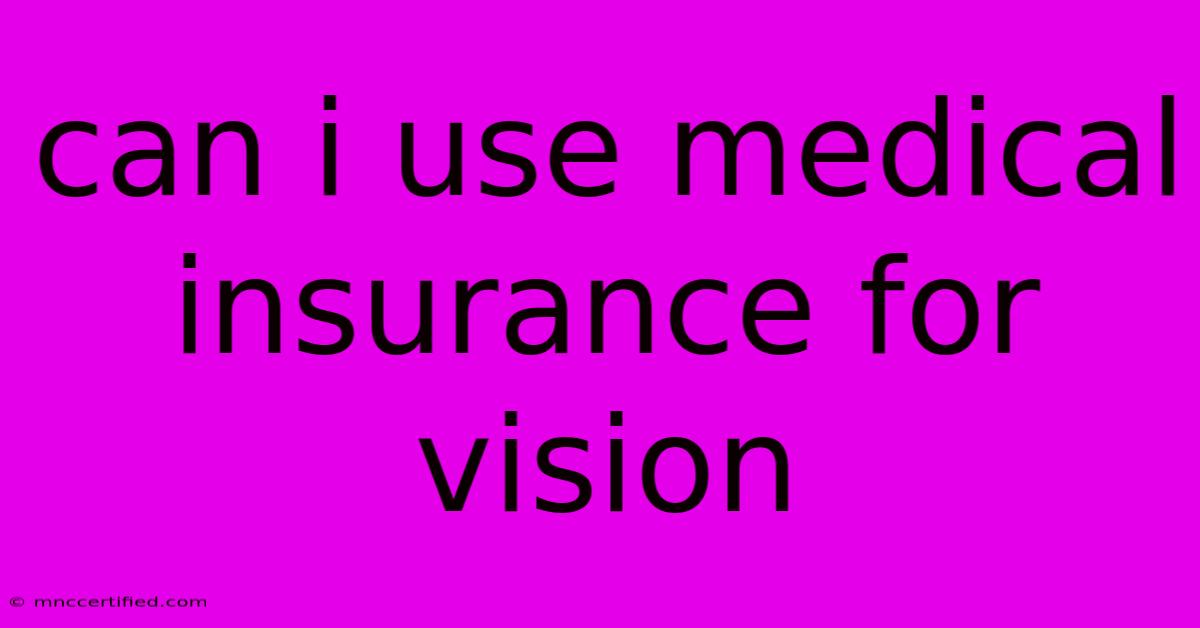Can I Use Medical Insurance For Vision

Table of Contents
Can I Use My Medical Insurance for Vision?
Vision care is an essential part of overall health and wellbeing. But many people wonder if their medical insurance covers the cost of eye exams, glasses, and contact lenses. The answer is not always. While some medical insurance plans include vision coverage, others do not. Here's a breakdown of what you need to know:
Understanding Medical and Vision Insurance
- Medical Insurance: Typically covers a wide range of healthcare services, including doctor visits, hospitalization, surgeries, and prescription drugs. It's often provided through employers or purchased individually.
- Vision Insurance: Specifically designed to cover eye care services like eye exams, eyeglasses, and contact lenses. It's usually purchased separately, often as a standalone plan or as an add-on to medical insurance.
Does My Medical Insurance Cover Vision?
The answer depends on your specific medical insurance plan. Here are some key points to consider:
- Check Your Plan Details: Carefully review your insurance policy documents or contact your insurance provider directly. They can confirm if your plan includes vision coverage.
- Basic Medical Coverage: Most basic medical insurance plans do not cover vision services. They might offer limited coverage for certain eye conditions related to general health, but they won't cover routine eye exams or vision correction.
- Comprehensive Plans: Some comprehensive medical insurance plans may offer limited vision coverage as part of their benefits. This could include a yearly eye exam or a small allowance for eyeglasses or contact lenses. However, these benefits are often capped, and you might still have to pay out-of-pocket for certain services.
When to Consider Vision Insurance
Even if your medical insurance offers some vision coverage, it's often a good idea to consider purchasing separate vision insurance. Here's why:
- Comprehensive Coverage: Vision insurance typically provides comprehensive coverage for a wide range of eye care services, including:
- Regular eye exams: Crucial for detecting eye conditions early.
- Eyeglasses: Including frames and lenses.
- Contact lenses: Including both soft and hard lenses.
- Eye surgery: For conditions like cataracts or glaucoma.
- Cost Savings: Vision insurance can significantly reduce the out-of-pocket expenses for eye care. It often offers discounts on eyeglasses, contact lenses, and other services.
- Flexibility: Vision insurance provides more flexibility in choosing your eye care provider and services.
Tips for Saving on Eye Care Costs
Here are some additional tips for saving money on eye care:
- Shop Around for Vision Insurance: Compare different plans and premiums to find the most affordable option that meets your needs.
- Take Advantage of Discounts: Many vision insurance plans offer discounts on eyeglasses, contact lenses, and other services.
- Ask About Flexible Spending Accounts (FSAs) or Health Savings Accounts (HSAs): These accounts can help you save pre-tax dollars on healthcare expenses, including eye care.
- Consider Online Retailers: Online retailers often offer more affordable prices on eyeglasses and contact lenses than traditional brick-and-mortar stores.
Conclusion
Whether or not your medical insurance covers vision care depends on your specific plan. While basic medical insurance plans generally don't offer vision coverage, some comprehensive plans might include limited benefits. However, it's often more cost-effective and provides more comprehensive coverage to purchase separate vision insurance.
By understanding your insurance options and utilizing cost-saving tips, you can ensure that you have the vision care you need without breaking the bank.

Thank you for visiting our website wich cover about Can I Use Medical Insurance For Vision. We hope the information provided has been useful to you. Feel free to contact us if you have any questions or need further assistance. See you next time and dont miss to bookmark.
Featured Posts
-
Old Fitzgerald Bourbon Bottled In Bond
Nov 09, 2024
-
Ionic Covalent Bonds Worksheet Answers
Nov 09, 2024
-
Insurance For Serving Alcohol At Event
Nov 09, 2024
-
Ireland Vs New Zealand Live Autumn Nations Series
Nov 09, 2024
-
Michigan Life Insurance Exam Questions
Nov 09, 2024